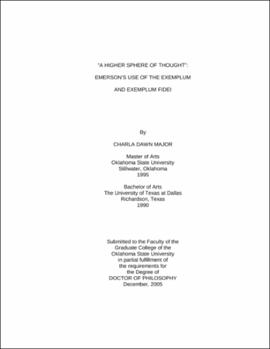| dc.contributor.advisor | Walker, Jeffrey | |
| dc.contributor.author | Major, Charla Dawn | |
| dc.date.accessioned | 2013-11-26T08:29:34Z | |
| dc.date.available | 2013-11-26T08:29:34Z | |
| dc.date.issued | 2005-12 | |
| dc.identifier.uri | https://hdl.handle.net/11244/7074 | |
| dc.description.abstract | Scope and Method of Study: The purpose of this study was to demonstrate how many of the beliefs of the minister continued to influence Ralph Waldo Emerson's articulation of transcendentalist tenets beginning with the publication of Nature. Although Emerson extends to man a more powerful and proactive role in the areas of intellectual pursuit and self-determination, he adheres to established Christian beliefs in much of his consideration of the issues of morality, contemplation, spirituality, and heroism. The presence of the moral sentiment within nature and the ability of the individual to access it through his exercise of autonomous thought establish the foundation upon which Emerson constructs his paradigm of the heroic exemplar, which exhibits signs of the imitatio Christi from both medieval hagiography and its subsequent Protestant transfigurations. Elements of both the Catholic exemplum and the Reformed exemplum fidei appear within the lives of Emerson's heroes and in his paradigm of the heroic exemplar. These notions remain consistent throughout his work and are apparent in his depictions of heroic individuals from Nature through the 1860s. | |
| dc.description.abstract | Findings and Conclusions: Despite the apparent belief of many of his critics that Emerson abandoned religion at the time he left the ministry, such a conclusion is not supported by close examination of his works. Besides the consistent primacy of the moral sentiment and the conception of Nature as intermediary between God and Man, the influence of Emerson the minister can be discerned in many of the connections between his paradigm of the heroic exemplar and the religious notions of exemplum and exemplum fidei. The catalyst for Emerson's hero, like that for both the saint and his Protestant equivalent, remains the moral or noble sentiment, and the process through which the individual attains the elevated status of the exemplar continues along a parallel course. Although Emerson's post-ministerial philosophy cannot be classified as truly religious in character, it contains a profoundly religious component. The evidence of his works reveals that even after Emerson left the ministry, he never surrendered the impulse he identifies in Nature as the religious sentiment. | |
| dc.format | application/pdf | |
| dc.language | en_US | |
| dc.rights | Copyright is held by the author who has granted the Oklahoma State University Library the non-exclusive right to share this material in its institutional repository. Contact Digital Library Services at lib-dls@okstate.edu or 405-744-9161 for the permission policy on the use, reproduction or distribution of this material. | |
| dc.title | "Higher sphere of thought": Emerson's use of the exemplum and exemplum fidei | |
| dc.contributor.committeeMember | Decker, William M. | |
| dc.contributor.committeeMember | Jones, Edward | |
| dc.contributor.committeeMember | Moses, L. G. | |
| osu.filename | Major_okstate_0664D_1592.pdf | |
| osu.accesstype | Open Access | |
| dc.type.genre | Dissertation | |
| dc.type.material | Text | |
| thesis.degree.discipline | English | |
| thesis.degree.grantor | Oklahoma State University | |
